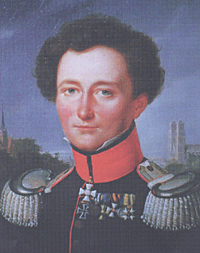Wellington and Blucher
Meet 16 June 1815:
Before the Battle of Ligny
Clausewitz’s Account
by Gary Cousins, Germany
| |
“Um 1 Uhr kam der Herzog von Wellington zum Feldmarschall Blücher bei der Wind-mühle von Brye an. Der Herzog sagte dem Feldmarschall daß seine Armee sich in diesem Augenblick bei Quatrebras versammele und daß er damit zu seiner Hülfe in wenig Stunden herbei eilen werde; “à quatre heures je serai ici”, sollen seine Worte gewesen sein, indem er dem Pferde die Sporen gab.”
Clausewitz (1780-1831)
“At one o’ clock the Duke of Wellington came to visit Field Marshal Blücher at the windmill of Brye. The Duke told the Field Marshal that, at that moment, his army was assembling at Quatre Bras, with which in a few hours he would be hurrying to his assistance: “At four o’clock I will be here”, are supposed to have been his words, as he spurred the horse.”
Pflugk-Harttung remarks at length upon the influence which the viewpoints of Gneisenau (with whom Clausewitz served during the Wars of Liberation, and in 1831, the year they both died of cholera) and the Prussian General Staff had on the German military literature of the 19th century. He suggests that the first part of Clausewitz’s version clearly derives from Wagner, whom he considered worthless on this issue, compared to the reports of witnesses - indeed after examining its historical accuracy he pronounced that Wagner’s version collapses.
8
Pflugk-Harttung thought that Clausewitz had embellished or softened some observations to produce his own version. Thus according to Clausewitz, Wellington’s army was still in the process of assembling (in Wagner’s version the assembly is complete). Clausewitz now gave a specific time by which Wellington promised to be at Ligny: but says that Wellington did not actually mean that he would bring his whole army within a few hours, which would have been an unreasonable expectation, but only the left wing and reserve, totalling 40-50,000 men. Combined with Blücher’s 80,000 men of Corps
I-III, this would give equality of numbers with the 130,000 [sic] French troops at Ligny, and taken together with Bülow’s IV Corps, on the arrival of which it was still reckoned (if with some unease), this would give superiority over the French. Clausewitz stated that battle was thus accepted in the belief that the initial inferiority of Prussian numbers at Ligny would be reversed during the day, until which point a battle of resistance was needed. Clausewitz also asserts that it was from Brye that Wellington first sent orders for his reserve to move up from the Forest of Soignies to Quatre Bras.
9
However, Pflugk-Harttung noticed particularly the wording of the final sentence in the above quotation, in which Clausewitz says of Wellington’s parting words, that they “are supposed to have been his words” - “sollen seine Worte gewesen sein”.
Pflugk-Harttung suggested that Clausewitz’s wording indicated that this was hearsay: Clausewitz did not hear the words directly, and so could not report directly what Wellington said, because he was not an “ear-witness”: “It is to be noted, that Clausewitz was not present during the discussion.”
If Pflugk-Harttung was right, then it is questionable whether Clausewitz was reliable as a witness, let alone as a historian, of the meeting.
10
Wellington and Blucher Meet 16 June 1815 Before the Battle of Ligny
|
 Clausewitz gives the following version of the meeting at the windmill at Brye: 7
Clausewitz gives the following version of the meeting at the windmill at Brye: 7